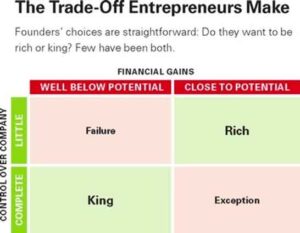This game ain’t for everybody…and that’s OK.
“Do you plan on raising capital from VC’s?”
That is one of the first questions I ask founders that I meet whose companies are in early stage. The question is quickly followed by a “Why?”
I find too often that while founders have a crisp answer for the first question, they are stumped by the second question. This is disconcerting as the second question should really help you answer the first. Here are some things to consider before making the decision to seek VC funding.
Lifestyle v Startup (High Growth)
A founder may have started a company because they were tired of the 9-5 grind and in addition to wanting to build their own company and wealth, they wanted to create flexibility in their schedules and location. Tim Ferriss’s “The 4-Hour Workweek” has influenced a new generation of founders who want to build better work-life balance into their companies. They’d like to travel, work remotely, and avoid managing too many individuals.
If you take VC money your job as a founder and company management is to grit, grind, and grow your company to the targets you have shared with your investors. You made a promise to others who believed in you and it is time to deliver. Oftentimes that means burning the midnight oil, postponing or canceling vacations, and just taking on a lot more work. When you take VC money this is the pact you make with the VC.
Further, lifestyle businesses are businesses that a founder can presumably run for the rest of their lives and perhaps pass on to their children. When you take VC money the expectation is that you will grow and lead the company to a liquidity event from a sale or IPO or you will be fired from the company. The way VC makes a return for their limited partners (and in turn get paid and be able to raise their next fund) requires that their portfolio companies hit these liquidity event home runs. Therefore, if you don’t see yourself as being willing to exit the company in the near future perhaps you should reconsider taking VC money.
Rich or King
A mentor of mine once asked me if I rather be Rich or King when I spoke to him about my decision to run my own practice. By this he meant would I rather have tons of wealth or would I rather be in control. I stated “King” as I wanted to control my time as well as how I would run my practice. Founders need to ask themselves this personal question before chasing VC money. Otherwise they run the risk of going down a path that does not align with their core needs.
The following chart from a Harvard Business Review Article written by Noam Wasserman illustrates the tension founders face when determining how large and thus how much outside capital and influence they want to bring into their companies.

If a founder decides to bring in VC they should expect their company to grow but they should also understand that they alone will not set the path for the company. Once you accept VC money expect to give up power on the board of directors – normally a board seat or two for your first round. Additionally, a seasoned VC will negotiate protective provisions that will require their approval for certain acts the founder’s company may want to take.
Are you VC Investable?
I’ll keep this one brief and will dive into this piece in more detail in a future post. A founder must make an honest assessment of whether or not their company can successfully raise from VC. Here are some high-level criteria that founder should consider:
- Team (Previous successful exits? Deep industry knowledge? Do you believe this team can get this done?)
- Revenue ($100K “True” Monthly Recurring Revenue (Austin))
- Market Size (X>$10BN Market)
- Clear Exit Strategy (Path to IPO or Strategic Acquisition)
- Other( Quality Accelerator or Advisors, Trusted Referral)
Closing Time
VC fundraising is a time intensive, grueling process that takes time away from running the operations of your business. If you decide to fundraise from VCs you need to assess if (i) you believe you can do it successfully and (ii) it fits the goals and needs of your company as well as yourself.
After reviewing the above you decide that you don’t want to raise from VCs. However, you still are in the need of capital. What do you do? In my next post I’ll discuss alternative forms of financing for companies.




